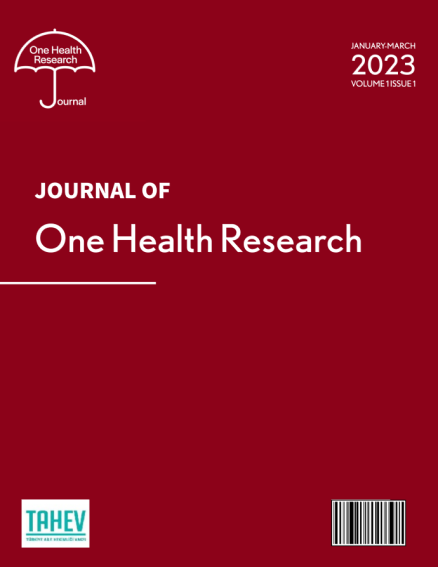Sociocultural factors affect COVID-19 vaccine hesitancy among pregnant women? A hospital-oriented cross-sectional study in Turkey
COVID-19 vaccine hesitancy
DOI:
https://doi.org/10.5281/zenodo.8422777Abstract
Aim: It was aimed to evaluate COVID-19 vaccine hesitancy among pregnant women. Material and Method: This study was a hospital-oriented cross-sectional study. The study population consisted of 8972 pregnant women. The number of pregnant women included in the study sample was 368. The dependent variable was vaccine hesitancy, whereas the independent variables consisted of the sociodemographic, bio-demographic and socioeconomic characteristics of pregnant women. Chi-square analysis was used for paired comparisons, and logistic regression analysis was used to determine risk factors.
Results: The rate of pregnant women who had vaccine hesitancy was 59.5% in this study. Vaccine hesitancy was 2,470-fold (CI: 1,319-4,625) higher in pregnant women who did not have a formal education than those who had a formal education, 8,136-fold (CI: 3,461-19,122) higher in pregnant women who had a living child in the household than those who did not, 1,776-fold (CI: 1,039-3,035) higher in pregnant women who had a wanted pregnancy than those who had an unwanted one and 7,485-fold (CI: 2,894-19,360) higher in pregnant women who were influenced by the social media than those who were not.
Conclusion: low education level, first pregnancy, desire for pregnancy and being influenced by the social media were the risk factors for COVID-19 vaccine hesitancy among pregnant women.
References
- Çantay H, Anuk T, Doğan G. The Effects of the Covid-19 Pandemic on the General Surgery Emergency Protocol. Kocaeli Medical Journal. 2021;10:56-60.
- Collin J, Byström E, Carnahan A. Public Health Agency of Sweden's Brief Report: Pregnant and postpartum women with severe acute respiratory syndrome coronavirus infection in intensive care in Sweden. Acta Obstet Gynecol Scand. 2020;99:819-822.
- Pfizer and BioNTech Announce Vaccine Candidate Against COVID-19 Achieved Success in First Interim Analysis from Phase 3 Study. Available at: URL: https://www.pfizer.com/news/press-release/press-release-detail/pfizer-and-biontech-announce-vaccine-candidate-against. (Accessed April 24,2021).
- Moderna Announces Primary Efficacy Analysis In Phase 3 Cove Study For Its Covid-19 Vaccine Candidate And Filing Today With U.S. Fda For Emergency Use Authorization. Available at: URL: https://investors.modernatx.com/news-releases/news-release-details/moderna-announces-primary-efficacy-analysis-phase-3-cove-study. (Accessed April 24,2021).
- Zimmer K, Corum J, Kristofferse M, Wee. Coronavirus Vaccine Tracker. Available at: URL: https://www.nytimes.com/interactive/2020/science/coronavirus-vaccine-tracker.html. (Accessed April 29,2021).
-Bloom BR, Nowak GJ, Orenstein W. "When Will We Have a Vaccine?" - Understanding Questions and Answers about Covid-19 Vaccination. N Engl J Med. 2020;383(23):2202-2204.
-Farrell R, Michie M, Pope R. Pregnant Women in Trials of Covid-19: A Critical Time to Consider Ethical Frameworks of Inclusion in Clinical Trials. Ethics Hum Res. 2020;42(4):17-23.
-World Health Organization. Strategic Advisory Group of Experts on Immunization (SAGE). Available at: URL:https://www.who.int/immunization/sage/meetings/2014/october/1_Report_WORKING_ GROUP_vaccine_hesitancy_final.pdf. (Accessed April 29,2021).
- Knoll MD, Wonodi C. Oxford-AstraZeneca COVID-19 vaccine efficacy. Lancet. 2021;397(10269):72-74.
- Covid-19 updated guide in Turkey. Available at: UR: https://dosyasb.saglik.gov.tr. (Accessed April 24,2021).
- Chen J, Spracklen CN, Marenne G. Meta-Analysis of Glucose and Insulin-related Traits Consortium (MAGIC). The trans-ancestral genomic architecture of glycemic traits. Nat Genet. 2021;53(6):840-860.
- Ahlers-Schmidt CR, Hervey AM, Neil T. Concerns of women regarding pregnancy and childbirth during the COVID-19 pandemic. Patient Educ Couns. 2020;103(12):2578–82.
- Park KS, Sun X, Aikins ME. Non-viral COVID-19 vaccine delivery systems. Adv Drug Deliv Rev. 2021;169:137-151.
- Salali GD, Uysal MS. COVID-19 vaccine hesitancy is associated with beliefs on the origin of the novel coronavirus in the UK and Turkey. Psychol Med. 2020;19:1-3.
- D'Souza R, Ashraf R, Rowe H. Pregnancy and COVID-19: pharmacologic considerations. Ultrasound Obstet Gynecol. 2021;57(2):195-203.
- Sallam M, Dababseh D, Eid H, et al. High Rates of COVID-19 Vaccine Hesitancy and Its Association with Conspiracy Beliefs: A Study in Jordan and Kuwait among Other Arab Countries. Vaccines (Basel). 2021;9(1):42.
- Catak B, Oner C. Sociocultural Factors Affecting Unplanned Deliveries at Home: A Community-Based Case Control Study. Soc Work Public Health. 2015;30(7):535-44.
- Harrison EA, Wu JW. Vaccine confidence in the time of COVID-19. Eur J Epidemiol. 2020;35(4):325-330.
- Yang J, Zheng Y, Gou X. Prevalence of comorbidities and its effects in patients infected with SARS-CoV-2: a systematic review and meta-analysis. Int J Infect Dis. 2020;94:91-95.
- Kourlaba G, Kourkouni E, Maistreli S. Willingness of Greek general population to get a COVID-19 vaccine. Glob Health Res Policy. 2021;6(1):3.
-Khubchandani J, Saiki D, Kandiah J. Masks, gloves, and the COVID-19 pandemic: Rapid assessment of public behaviors in the United States. Epidemiologia. 2020;1(1):16.
- Applewhite A, Stancampiano FF, Harris DM. A Retrospective Analysis of Gender-Based Difference in Adherence to Influenza Vaccination during the 2018-2019 Season. J Prim Care Community Health. 2020;11:21-50.
- Razai MS, Osama T, McKechnie DGJ. Covid-19 vaccine hesitancy among ethnic minority groups. BMJ. 2021;26:372-513.
-Blankenship EB, Goff ME, Yin J. Sentiment, Contents, and Retweets: A Study of Two Vaccine-Related Twitter Datasets. Perm J. 2018;22:17-138.
-Basch CH, MacLean SA. A content analysis of HPV related posts on instagram. Hum Vaccin Immunother. 2019;15(7-8):1476-1478.
-Puri N, Coomes EA, Haghbayan H. Social media and vaccine hesitancy: new updates for the era of COVID-19 and globalized infectious diseases. Hum Vaccin Immunother. 2020;16(11):2586-2593.

Downloads
Published
How to Cite
Issue
Section
License
Copyright (c) 2023 Journal of One Health Research

This work is licensed under a Creative Commons Attribution 4.0 International License.



